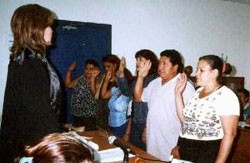
Challenge
Nicaragua's Criminal Procedures Code had not been changed since it was originally established in 1879. This code gave judges alone the principal responsibility for investigating and prosecuting crimes. All evidence was required to be presented in writing, and people accused of crimes had little or no opportunity to present their defense in court.
Initiative
Since 1999, USAID has played an active role in supporting the development of a new criminal procedures code that would help modernize Nicaragua's judicial system and strengthen democracy. USAID provided $3 million in technical assistance and training to prepare judges, prosecutors, public defenders and other actors for its implementation.
Results
The new criminal procedures code became effective in December 2002. A month later, Nicaragua began holding its first public, oral trials of criminal cases. Under the new code, judges act as impartial arbiters, and prosecutors, public defenders and the police participate more actively in the prosecution and judicial process. The new code has gone a long way to ensure a public, transparent process in which rights of both the victims and the accused are respected.







Comment
Make a general inquiry or suggest an improvement.